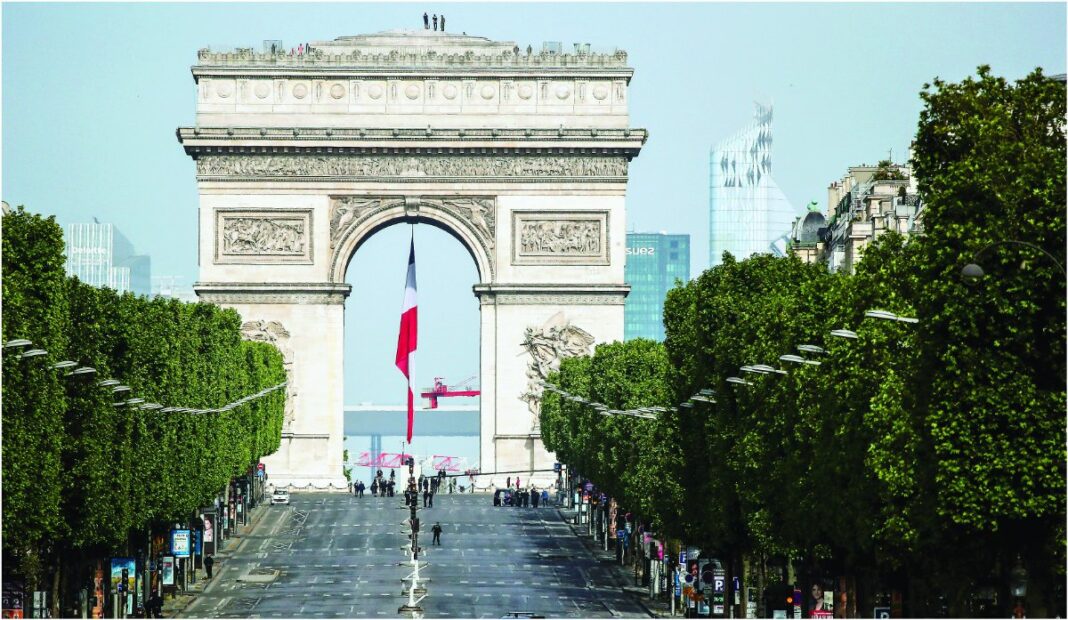PARIS: Crown Prince Mohammed bin Salman’s first visit to Paris in 2018 had exposure as an objective. At the time, he as well as Emmanuel Macron were making their first steps as young leaders.
Much has happened in four years, and the world, as we have known it, has changed. The first objective of the crown prince in Paris is to highlight the changes and other reforms undergone by the Kingdom.
As pointed out by Cedomir Nestorovic, professor of geopolitics at ESSEC, the important thing to assess is whether “the massive reforms and the structural change of the Saudi society driven by the crown prince have been sufficiently noticed abroad.”
The crown prince can boast today a real resume in terms of reforms.
He will be able to answer critics and face them with the positive dynamics to which Saudi Arabia has committed and underline the benefits of Arab modernity. When asked about the subject, several French legislators consider this visit to be strategically significant both for the crown prince and Macron.
Energy, according to Nestorovic, is of course the other focal point. During this period of conflict between Russia and Ukraine, gas and oil have become rare and expensive, and Europe apprehends the cold of winter.
By distancing itself from the conflict, Saudi Arabia managed, at first, to play the role of arbitrator, but the recent spectacular rapprochement between Vladimir Putin and his Turkish and Iranian counterparts reminded the Gulf monarchies that the Russian card could be a double-edged sword.
Also to be considered is the issue of Western leadership. By traveling to France, the crown prince seems to return the favor to Macron, who was the first Western head of state to visit him.
It also appears that relations have greatly improved and that France is increasingly present in Saudi Arabia.
If Macron understands the change of course initiated by the Kingdom for several years now, he will probably be in a better position than the US president to discuss energy issues.
Indeed, during the meeting with Joe Biden, Saudi Arabia pledged to support the West’s energy supply. But, for the time being, the real measures have not yet been taken. Similarly, the price of oil and gas has not really been addressed.
Macron and the crown prince have their own cards to play, by showing that the relationship between the West and Saudi Arabia no longer necessarily passes solely through the United States.
This section contains relevant reference points, placed in (Opinion field)
This visit, therefore, has a strategic dimension since it deals with Europe’s energy security. But it also has, as is so often the case, a political dimension. Will the two young leaders be able to understand each other better?
Will we be able to say that the new French approach in Saudi Arabia is more realistic and keeps pace with the reforms and the transformation of the Kingdom?
Given the Saudi delegation accompanying the crown prince, it seems that the “economic development” aspect will be at the heart of the talks.
Should contacts between economic leaders be as flourishing as expected, this will play a strong role in helping Saudi Arabia gain stature among nations as a major player.
The French Revolution of 1789 saw France transform from a monarchy to a republic, which came under the control of Napoleon Bonaparte 10 years later. After he became emperor of the First French Empire from 1804-1814, his armies conquered large swaths of continental Europe.
Another monarchy emerged from the wake of Napoleon’s defeat at Waterloo in 1815, and Napoleon’s nephew created the Second Empire in 1852, becoming the last monarch to rule over France. He was ousted and the monarchy was replaced by the Third French Republic in 1870.
Throughout the 19th century and early 20th century, France maintained a large colonial empire across West Africa, Southeast Asia and the Middle East.
France sided with the Allied Powers during the Second World War, but was split in two during the conflict, with most of the country controlled by a collaborationist, pro-German government.
The country slowly recovered after the end of the war, but long wars in its colonies in Indochina (now Vietnam) and Algeria saw it ousted from these regions, and by the 1960s, most of France’s former colonies had achieved independence.
France has been a full member of the UN Security Council and NATO since the end of the Second World War, and played a vital role in the establishment of the EU.
France has a large Muslim and Arab population owing to its former colonies in north Africa, and many of these populations suffer from social alienation and high unemployment rates.
The country has been the site of unrest and protests against the enforcement of strict secular policies and controversial bills, some of which have attempted to ban the wearing of headscarves or traditional Muslim face coverings in public.




